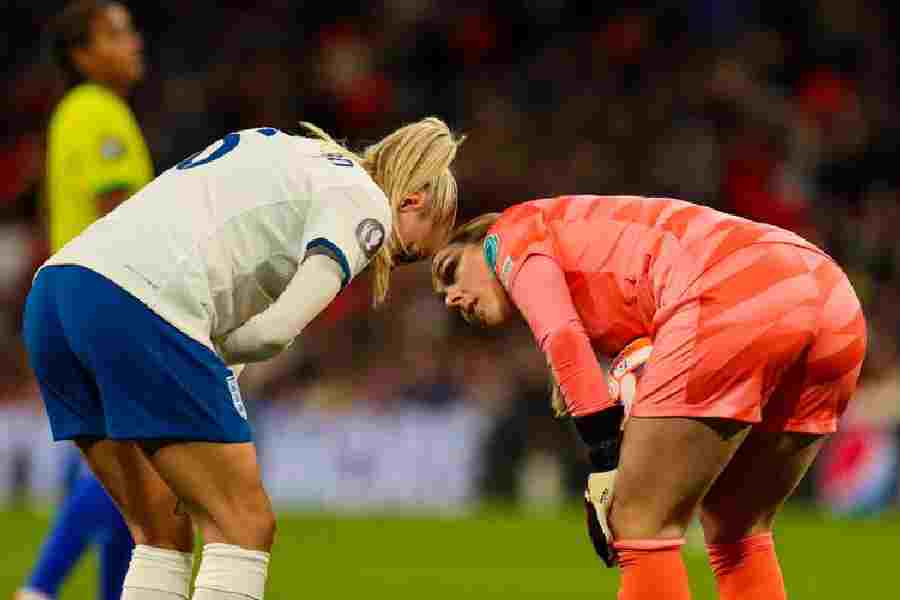Alex Greenwood wanted to keep playing. After all, the first-ever Women's Finalissima title was at stake at London's Wembley Stadium at the beginning of April: European champions England were playing against South American champions Brazil.
In the 73rd minute, Greenwood, a star defender, hit her head hard on the turf after a duel with Brazil's Geyse, and had to be treated for several minutes. She played on. In the penalty shootout to decide the match, Greenwood scored and ended up celebrating the title with the Lionesses.
A day later, she left the national team, officially because of knee problems, unofficially because she was being given time to recover from the incident. Experts sharply criticized Greenwood for continuing to play despite a suspected concussion. If FIFA, football's world governing body, has its way, incidents like that will not be repeated at the upcoming World Cup in Australia and New Zealand from July 20 to August 20.
Positive experience in Qatar
For the first time at a Women's World Cup, FIFA is using so-called "concussion spotters." These detectives follow the World Cup matches on screen and also have the opportunity to watch certain scenes again in slow motion. If the sports physicians commissioned by FIFA think a player may have suffered a serious head injury, they sound the alarm and inform the team doctors of the team in question.
The "spotters" debut at the men's World Cup in Qatar at the end of 2022 was a success, "as FIFA received positive feedback from the participating member associations," the world governing body told DW. "Generally speaking, FIFA has made tackling the issue of brain injuries in soccer a key objective of its Medical Subdivision."
There had also been a case like that of Greenwood in Qatar: In Iran's first World Cup match against England, goalkeeper Alireza Beiranvand had initially continued to play, although he had bled from his nose after a violent collision with a teammate and had been treated for minutes. A short time later, Beiranvand was substituted and taken to hospital.
According to reports, FIFA's concussion spotter had intervened. In the days following the match, according to media reports, the world governing body urged the Iranian team to comply with FIFA's treatment protocol for head injuries in the future as Beiranvand should have been taken off the pitch immediately.
Warning of long-term consequences
Concussion spotters are not a FIFA idea. In fact, the world governing body is rather late in deploying them compared to other contact sports. In the 2012 season, for example, the National Football League (NFL) began to have all games monitored by independent sports physicians with a view to possible head injuries. Since 2015, they have been allowed to interrupt games, and since 2016 there have even been two experts on duty per game. On average, the "spotters" report two suspected cases of head or neck injuries per game.
For many years, scientists have been warning not only about the immediate but also the long-term consequences of severe head injuries in sports: for example, a higher risk in old age of neurodegenerative diseases such as CTE (chronic traumatic encephalopathy), Alzheimer's or other forms of dementia.
Inequality in sports medicine
Female athletes have tended to be neglected in scientific studies to date, with about 80% of participants having been men. Yet there is evidence from several studies that women — for different reasons — sustain concussions in sports more often than men, and that they take longer to recover from head injuries. For this reason, scientists are debating whether it makes sense to establish separate treatment protocols for female athletes.
Jaclyn Caccese of Ohio State University, a longtime researcher on head injuries in sports, doesn't see this as a top priority.
"Rather than focusing on concussion protocols tailored to women, we probably need to first focus efforts on ensuring that women have the same access to athletic training services and sports medical care," the U.S. scientist told DW.
"Disparities in access to care may result in less concussion education, delayed removal from play/diagnosis/initiation of treatment, and ultimately delayed recovery."
More safety, regardless of gender
Tracey Covassin, another expert on head injuries in sports, has a similar view. There is a need to ensure "all sports have a certified athletic trainer present and not just for football games," the Michigan State University professor told DW.
"Women’s sports need to be taken seriously and having an athletic trainer is the first step to making sure all suspected concussions are assessed and treated by a healthcare provider." All concussions, Covassin said, should be treated "on an individual basis regardless of sex."
Both scientists believe FIFA's decision to deploy "concussion spotters" at the World Cup in Australia and New Zealand makes sense.
"I think anything that a male sport has to make the sport safer needs to be implemented in women’s sports so this is a good start," Covassin said. "If the spotter can help one concussed athlete not return to the pitch then we have made an effort to keep athletes safe."
More conservative approach with women
FIFA sees no need to treat female football players differently than male players when it comes to concussions. FIFA's treatment protocol includes a program designed to ensure that athletes do not return to the pitch too soon after head injuries, the world governing body let it be known.
"This pathway refers to stages rather than days, thus allowing it to be applicable to both females and those under 18," it said.
"The player should only be medically cleared to return to match play when each stage has been completed without symptoms.
"With younger players and players with certain risk factors, such as a history of repetitive concussive injuries or females, a more conservative approach must be followed.“
Incidentally, without the injured Greenwood, England's European champions lost 2-0 to World Cup hosts Australia after previously going 30 games without defeat. The 29-year-old, known for her detached and prudent defensive work, was sorely missed. But the break after the heavy impact with her head was necessary for Greenwood's lasting health, which is more important than any short-term success.










